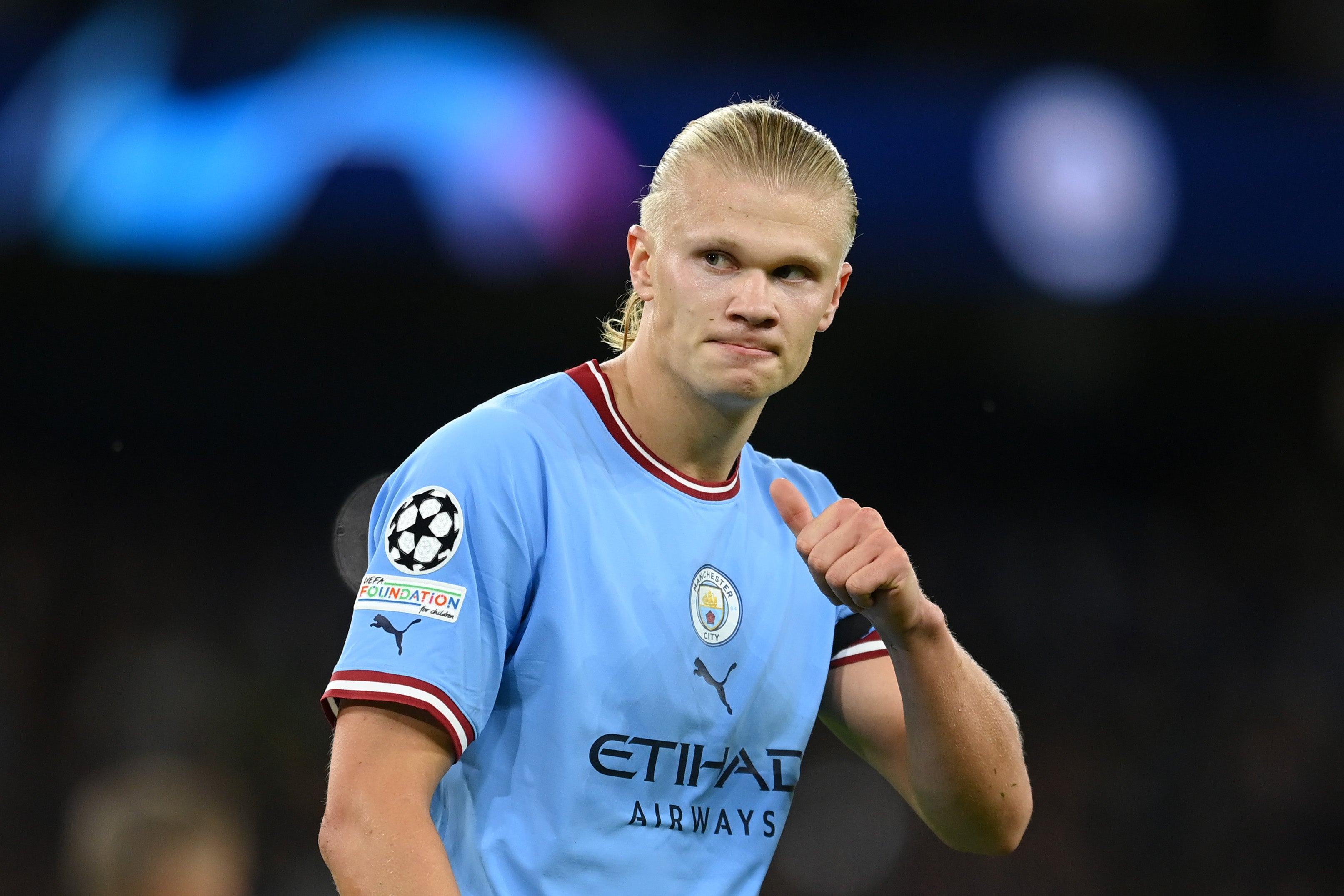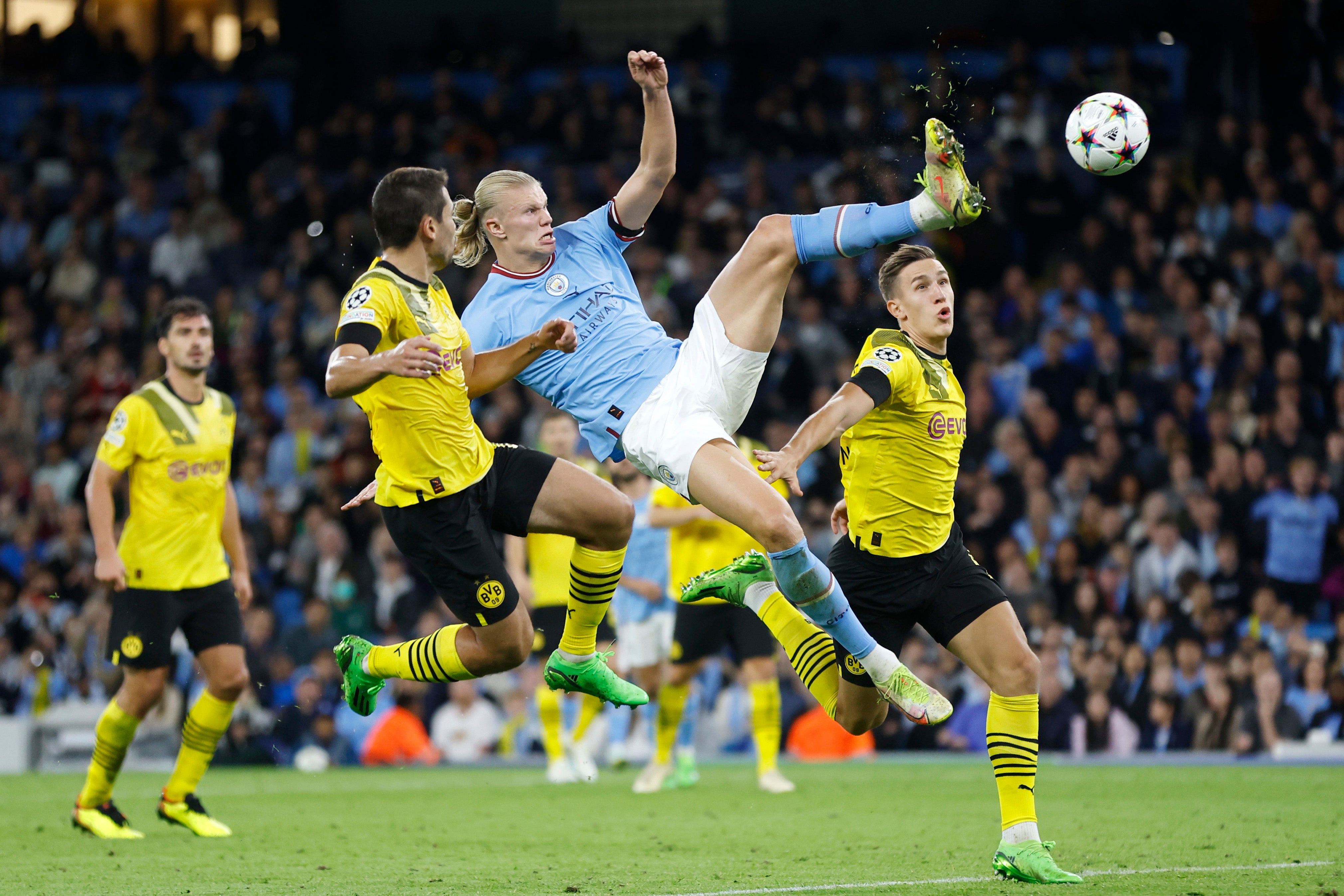Erling Haaland did the inevitable but in the most extraordinary fashion
The Norwegian forward’s acrobatic finish gave Man City a Champions League win over former club Borussia Dortmund to cement his status as king of the penalty box

Your support helps us to tell the story
From reproductive rights to climate change to Big Tech, The Independent is on the ground when the story is developing. Whether it's investigating the financials of Elon Musk's pro-Trump PAC or producing our latest documentary, 'The A Word', which shines a light on the American women fighting for reproductive rights, we know how important it is to parse out the facts from the messaging.
At such a critical moment in US history, we need reporters on the ground. Your donation allows us to keep sending journalists to speak to both sides of the story.
The Independent is trusted by Americans across the entire political spectrum. And unlike many other quality news outlets, we choose not to lock Americans out of our reporting and analysis with paywalls. We believe quality journalism should be available to everyone, paid for by those who can afford it.
Your support makes all the difference.It was the Manuel Akanji derby, but it wasn’t just the Manuel Akanji derby. Not when Ilkay Gundogan was playing as well. It transpired there was another common denominator between Manchester City and Borussia Dortmund and not merely because Sergio Gomez was an unused substitute.
Erling Haaland has shown the ability to be prolific for both City and Dortmund. Not, admittedly, when playing for Dortmund against City but, eventually, having swapped clubs and colours, he did find the net. The goal that felt an inevitability when the groups were drawn came in extraordinary fashion, Haaland contorting his giant frame, volleying almost at head height, meeting Joao Cancelo’s outside-of-the-boot cross with an outside-of-the-boot finish. Perhaps only he could have scored it. Cruelly for Dortmund, he did.
It took his Champions League tally to 26 goals in just 20 games – even factoring in the two times City shut him out – which leaves him just one adrift of Rivaldo and Luis Suarez and left Dortmund, who had glimpsed victory, bereft in defeat. The surprise was not that Haaland scored but that John Stones did, and in such spectacular style. If a thunderbolt can swerve, his did. Goalkeeper Alexander Meyer looked taken aback.
Those in yellow and black are more accustomed to the sight of Haaland celebrating. He scored 86 goals in 89 outings for them and, if that did not give them enough grounds to rue the one that got away, the successor they headhunted, Sebastien Haller, was cruelly sidelined. Yet Jude Bellingham’s opportunistic finish showed that Dortmund have other ways of sourcing goals and making money.
The Ruhr valley is Germany’s industrial heartland and the Englishman should be the next off the conveyor belt in the talent factory. Haaland was a bargain at £51 million, and it will take more to buy Bellingham, but Pep Guardiola has been raiding Dortmund since his days as Bayern Munich manager. Then Robert Lewandowski was his striking signing. Haaland was this summer’s big buy.
But, a day after Lewandowski’s unproductive return to Bayern, the Norwegian enjoyed a happier reunion. He ended up applauded by many in the travelling Dortmund support, assuming his regular role as match-winner and with an 11th goal in six games.

Dortmund had defended well, denied him many openings and yet he was inches from scoring earlier and almost on the end of everything. Haaland had clipped the outside of the post after an incisive pass from Kevin de Bruyne. City’s problem was that, apart from the indefatigable Belgian, Haaland was starved of service in a first half when they lacked a shot on target. Riyad Mahrez, Jack Grealish and Gundogan were all subdued and substituted.
Perhaps familiarity gave Dortmund an understanding of how to stop Haaland. Certainly cutting out much of the supply line helped. So did a flawlessness at providing last-gasp interventions. A stretching Meyer caught De Bruyne’s cross when Haaland was eyeing a tap-in. He almost met the Belgian’s pass when Mats Hummels intercepted. The sliding World Cup winner made another invaluable intervention when Phil Foden crossed.
He was terrific. He formed part of a centre-back partnership who could be deemed Bayern’s cast-offs: the traffic between Dortmund and Bavaria is not one-way. Alongside him, Niklas Sule headed away from under his own bar to stop Haaland turning in Mahrez’s cross. Sule, in possibly the biggest shirt any footballer has donned since Neil Ruddock’s heyday, presented an unlikely opponent but an obdurate one.
He scarcely looked a footballer but formed a formidable barrier to goal. Sule’s arrival from Bayern Munich helped make Akanji surplus to requirements; so did the summer signing of Nico Schlotterbeck and manager Edin Terzic had just brought on him as a third centre-back to see out a famous victory when Stones struck.
The plan, it seemed, was to crowd Haaland out. He had the fewest touches in the first half, though that feels unsurprising. Such can be the life of the poacher, the player with fewest touches but the most important interventions. They lead a life of quality, not quantity but Haaland’s goal was of the highest calibre. It was his best for City so far but, even when going for the acrobatic, that he remains the king of the penalty box, whether in Dortmund or Manchester.
Join our commenting forum
Join thought-provoking conversations, follow other Independent readers and see their replies
Comments